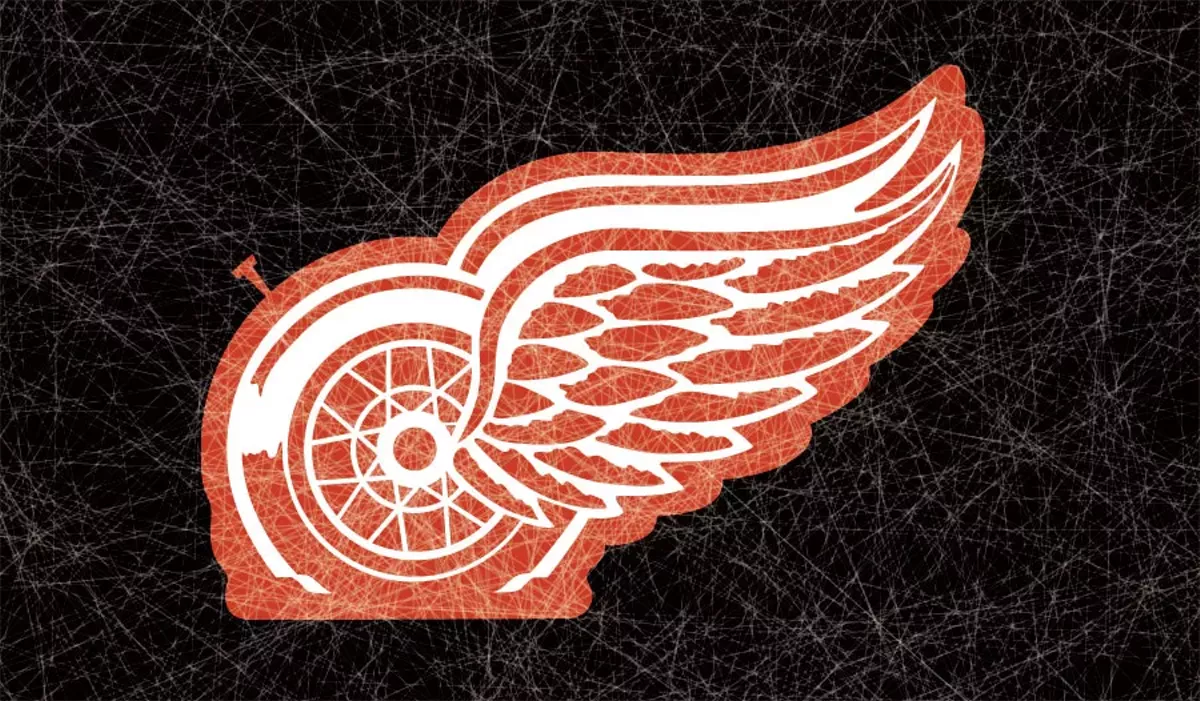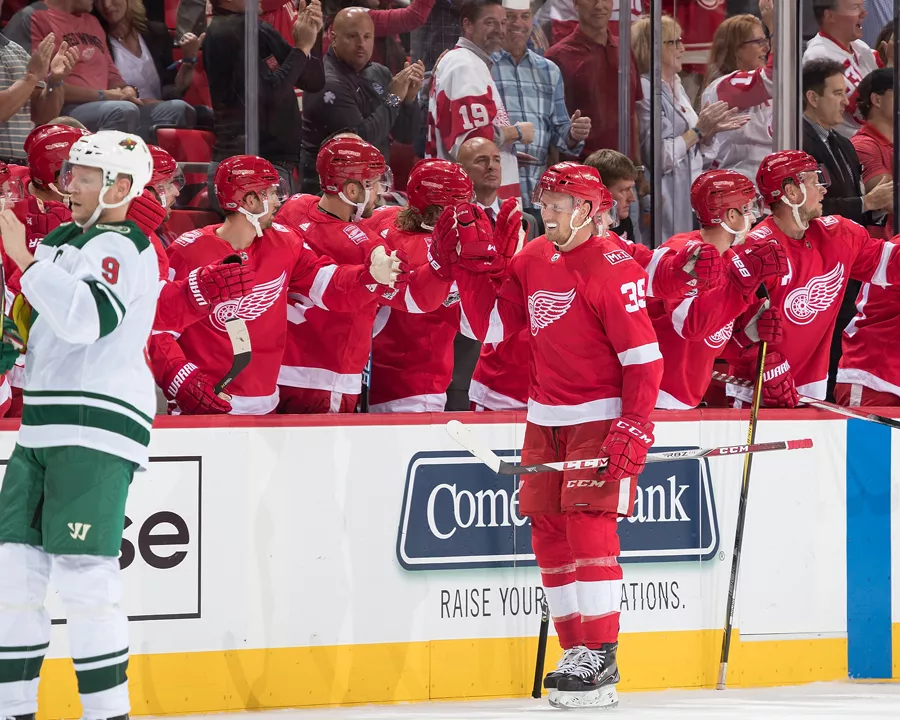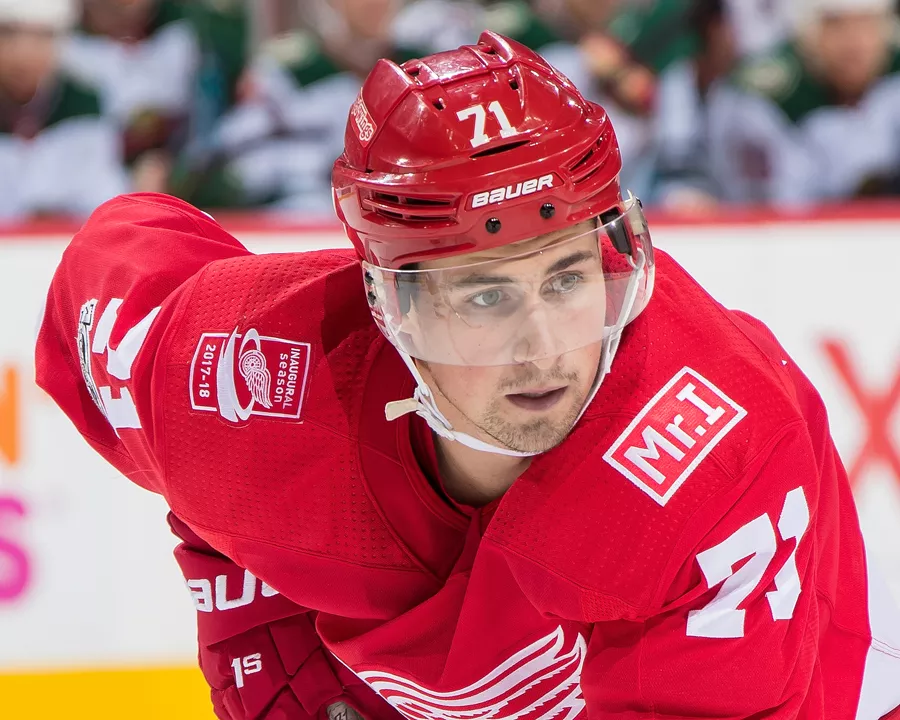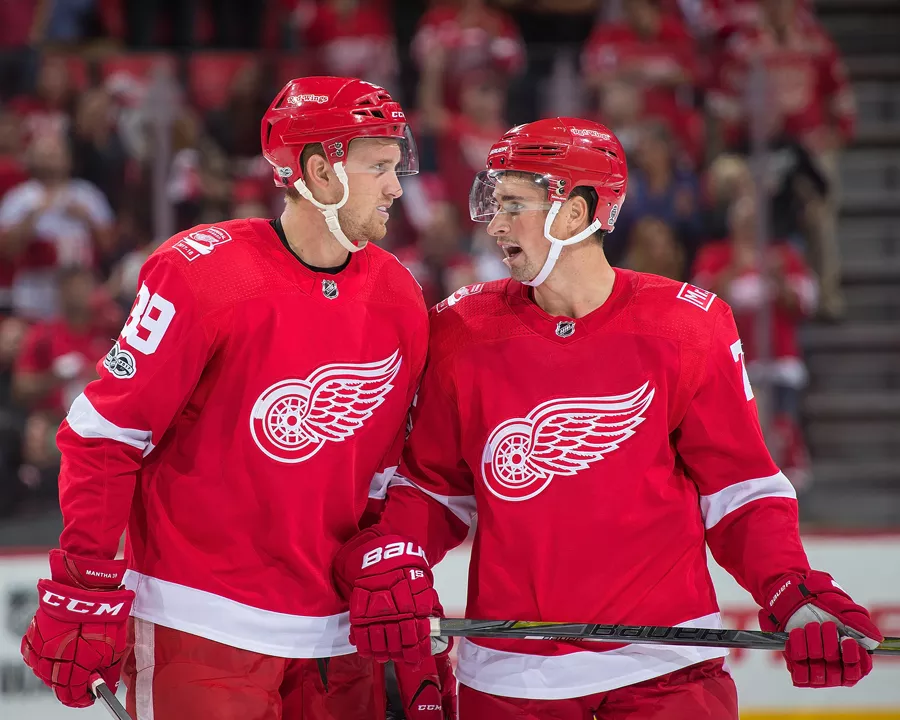There's perhaps no pro sports team in recent memory that spoiled its fans with its success quite like the Detroit Red Wings. The team's fanbase witnessed an organization with an embarrassment of riches make the playoffs for 25 straight seasons — the longest such run in pro sports until it ended in April 2016. During that time the team brought four Stanley Cups home to Detroit, while serving as the National Hockey League's model for how to find and sustain success.
But now, in late 2017 — a few months after Detroit finished last season in the league's bottom five, and following the buzz of the team's new home at Little Caesars Arena — many in the press are using the Wings as an example of what not to do. For those of us fans who are used to decades of positive press, it all feels a little harsh.
As Greg Wyshynski cracked on Yahoo: "The Detroit Red Wings have been mismanaged into oblivion, but you knew that."
The Hockey News feels similar, noting: "Denial is a powerful thing. It kept the Detroit Red Wings in the playoff picture for an astonishing 25 consecutive seasons. Now it threatens to bind their feet in cement for years to come."
Or, as The Score warns: "Look away, Detroit fans. These aren't the Red Wings you grew up on."
"Pain is coming to the Detroit Red Wings," The Athletic forecasts.
Or, as Yahoo's Puck Daddy columnist Ryan Lambert — a guy the fan base generally despises for being one of the first to point out the cracks in the foundation five years ago — put it: "Here's what's so wild about the Detroit Red Wings: Everyone agrees they're bad. Everyone agrees they're rebuilding. Everyone agrees they've got a ton of dead money on the books for years to come; they have the highest payroll in the league right now ... So the idea that they would now be even thinking about jerking around one of the few promising young players they actually have on the NHL roster is a sign of just how poorly run they are."
Oof.
Harsh indeed, but most will agree that such assessments are accurate. Though it's possible that the Wings return to the playoffs this season — especially if Jimmy Howard continues stealing games as he has during the season's outset — the smart money is on another bottom rung finish. And, either way, there's no solid young core around which the team can build.
That's partly a result of the cyclical nature of success in pro sports. A given team wins for a run of years, its stars age, the core breaks up, and the team stinks and sinks to their leagues' depths. Its management then assembles a new generation of stars, mostly through high draft picks. In the NHL, a hard salary cap strengthens and compresses that loop.
What's impressive about Detroit is that it defied the cycle and put together successive generations of superstars over the last two decades. Steve Yzerman, Dominik Hasek, Sergei Fedorov, Brendan Shanahan, and the elite talent of the late '90s and early 2000s passed the baton to guys like Nick Lidstrom, Pavel Datsyuk, Chris Osgood, and Henrik Zetterberg.
But the latter group aged or retired over the last seven years, most of the support players with a real role in the team's last Stanley Cup run in 2008 are gone, and there's no new generation of players in place to make a third push.
So in that way, the dethroning of the Red Wings is not an unusual tale. But there's more.
A growing portion of the fan base feels the Red Wings are indeed "mismanaged into oblivion," and there's no coherent or effective plan going forward. That's leaving some to fear that the organization is entering what could be the opposite of its past success — a protracted run in mediocrity.
The blame for the team's position mostly falls on general manager Ken Holland. Once considered to be the league's best GM, Holland, who took the helm in 1997, is now viewed by some as an obstacle to the franchise's rebuild.
That's the result of a litany of perceived missteps. Fair or not, he receives criticism for the Wings' salary cap management, poor drafting, poor player development, over-reliance on older veterans, overvaluation of its players, and focus on getting bigger while the most successful NHL teams are trending younger and faster.
The worst of the fallout from management's decision to sell off draft picks at the trade deadline to sustain the playoff streak during the last five years is what we see today — a dearth of young talent. And that's frustrating to a fanbase tired of a mediocre hockey team stumbling into the playoffs just to be bounced in the first round. They're ready for a full rebuild.
As "J.J. from Kansas," the editor at the SB Nation blog Winging It in Motown, puts it, "It's death by a thousand papercuts." The sum of these issues is the source of fans' frustration, which can be anecdotally found on any of its fan blogs, or in The Hockey News' "Front Office Confidence" survey, an assessment of the most disgruntled fan bases which found Detroit's to rank third.
"The really passionate fans are worried, upset, frustrated," J.J. tells us. "They're willing to accept the bad; they're just out of patience with mediocre, and that's right where the Wings are."
The ongoing mediocrity is partly a result of fans' and the organization's unrelenting trust in Holland for so many years. But even his most ardent supporters are now forced to accept the situation.
"The amount of things that you had to do wrong for this to happen is pretty high," the Puck Daddy's Lambert says. "You had to overvalue veterans, not draft well, trade away draft picks ... and [management] screwed up on so many fronts that there were no real safety nets. They had so much success for so long that everyone is giving them the benefit of the doubt, which is understandable. But if you looked at a little more closely, this decline is evident to anyone who was paying attention for the last four to five years."
‘The amount of things that you had to do wrong for this to happen is pretty high.’
tweet this
There's some real danger in GMs receiving too much slack in the salary cap-era NHL, as Frank Provenzano — a former NHL executive with the Washington Capitals and Dallas Stars — writes in an article for The Athletic that examines the challenges facing Holland.
"Virtually every team in the NHL thinks they are special in some way, shape, or form (OK, maybe not Winnipeg). This is even more pronounced when you have actually been special. Organizational hubris gets woven into your DNA, and only gets worse when you start filling the front office and coaching ranks with former players from your golden era," Provenzano writes.
"Everyone drinks the Kool-Aid, and there is often no voice in the room to offer a counter-balancing opinion. The real danger here is that you lose perspective of where you actually are in your competitive cycle, and then compound this by making poor free agent and/or contract decisions to reinforce your perception of being a destination franchise."
To understand the whys of all this, it helps to revisit the team's Golden Age.
A genius is born
Upon Holland's promotion from co-interim general manager to full-time general manager in July 1997, the team was in between winning its first and second Stanley Cups in the modern era.
Yzerman, Fedorov, Shanahan, Igor Larionov, Lidstrom, and Slava Fetisov made up that season's sterling roster. Though that felt like a team for the ages, Holland would somehow assemble an arguably more superior product just a few years later.
And during the next 25 years under Holland's guidance the Wings would win a lot. That list of accomplishments includes 10 division titles, five conference titles, four President's Trophies, three Stanley Cups, and more regular-season wins (789) and postseason wins (118) than any other NHL team.
With Holland under fire for today's situation, it's easy to forget those numbers.
"In terms of regarding someone's legacy, it's easier to remember them as all good or all bad," J.J. says. "At some point it caught up with him, but Ken Holland, prior to 2010 ... was really good at changing with the league, and he set the standard in how to do that."
Part of that had to do with resources. Before the NHL enforced a salary cap in 2005, the Wings benefited from its late owner and pizza mogul Mike Ilitch's willingness to spend money to lure high end players to win cups (though it's worth noting that the New York Rangers consistently spent more on payroll, with far less success).
And the talent wasn't limited to the ice. Scotty Bowman, one of the game's great minds, stood behind the bench. Holland ran the front office with Jimmy Devellano, while the brilliant Hakan Andersson and Jim Nill operated what was considered one of the top scouting departments.
The latter partly earned that reputation on two draft picks that would ultimately propel the Wings for another generation, but arguably doom it for the generation after that. In the late '90s Holland and Andersson were among the very first to mine talent in Europe and Russia, and in 1998 and 1999 the organization drafted Pavel Datsyuk and Henrik Zetterberg in the sixth and seventh rounds, respectively.
By 2002, with Ilitch's checkbook still open, Holland pulled together some of the game's best talent by offering money and the prospect of winning a championship. That season's Stanley Cup-winning team held 10 future hall of famers, and was a joy to watch.
But the 2005 lockout season brought an end to the open checkbook era of the Wings' success. In an effort to force league parity and pay players less, the NHL's owners demanded a salary cap. That forced the Wings to reduce its 2004 payroll from $77 million to $39 million in 2006, and many wondered if it would spell the end of the organization's dominance.
It didn't. In what many say may be Holland's finest moment, he pared down the team's salary without really breaking up the band. As J.J. notes, that involved making a hard decision to part with veterans like Darren McCarty, Dominik Hasek, Brett Hull, and Curtis Joseph, and turn the team over to its youth. (Though 10 years later, much to the chagrin of fans, Holland would choose not to turn over the team to the kids.) Beyond that, stars like Lidstrom, Yzerman, and Chelios all took paycuts to get the team under the cap.
And two years later, the new Red Wings won another cup, led by a peaking Zetterberg and Datsyuk, who seamlessly took over the reigns of Yzerman and Shanahan by 2008. Holland fortified that team with 20-goal scorers like Johan Franzen, Tomas Holmstrom, Jirí Hudler, and on defense, the talented Brian Rafalski.
Nearly the same team went to the Stanley Cup finals again the next season, losing in a dramatic game 7 to the Sidney Crosby-led Pittsburgh.
In hindsight, that was the last real chance the Wings had at winning the cup — and the start of a slow spiral.
A genius flames out
One of the fans' frustrations with the Red Wings over the last five years is that it didn't publicly acknowledge the slow organizational rot until this past summer, and did little to remedy the situation. ("We like our team" and "We're going to take a wait-and-see approach" will be scrawled on Holland's headstone.)
However, there was at least an indirect acknowledgment that things were going south when the Red Wings courted stars Zach Parise and Ryan Suter during the 2012 free agency period. After all, Mr I. doesn't join an envoy on his private jet to visit Suter's Wisconsin farm with $90 million checks in hand to pitch Detroit as a destination for nothing.
By then, signs of things to come were there — the Wings' top seven goal scorers in 2011 were over 30 years old, and Lidstrom, at that point, was a year from retiring.
But Parise and Suter chose a boring Minnesota team over Detroit — "like someone choosing spinach over ice cream," as one writer put it — a shock for a former destination organization.
No longer able to attract the league's top talent, the Wings signed players like a broken-down Brad Richards, an also broken-down Mike Modano, and what J.J. characterizes as "the biggest blunder of them all" — Stephen Weiss. Several years later, the Wings bought out the struggling center, meaning his part of his contract still counts against the salary cap.
Furthermore, Detroit's payroll is higher than nearly every team in the league, but large chunks are tied to mediocre players like Justin Abdelkader at $4.25 million per year through 2023; Jonathan Ericsson at $4.25 million per year through 2020; Darren Helm at $3.85 million per year through 2021; and two goalies pulling a combined total of more than $9 million.
Craig Custance, a former ESPN writer who now covers the Wings for The Athletic, says that presents even more challenges for the organization.
"It's going to be hard to turn things around because they are saddled with bad contracts. Part of it is the evolution of the NHL. They have some contracts left over from the glory days, and those are excusable. When they were winning cups, that's the price they paid," Custance says. "When you get into difficulties is contracts for guys like Helm, Abdelkader, Nielsen, and other older, non-star players. And you're paying them at a generous rate into the future at a time when it may be better to play the prospects and go into a more traditional rebuild."
The contracts do more extensive damage than what's seen on the surface. Puck Daddy's Lambert notes that Holland convinced Lidstrom to take a below-market value contract at $6.2 million per year, and that set up Holland to convince other players to take team-friendly deals. After all, why should anyone be paid more than Lidstrom?
But now the opposite is true. Abdlekader, Helm, and even Luke Glendening are overpaid, and that sets up Holland for trouble when it comes time to pay guys who do score, like Tomas Tatar and Andreas Athanasiou. The latter recently left for Switzerland because the Wings don't have enough free salary cap space to pay him what he's worth — the "jerking around" to which Lambert previously referred.
"Now they're in this situation where they have to overpay everybody, and why would you want that to be your operating position going forward?" Lambert asks.
Holland, of course, isn't oblivious to the contracts, as some unfairly suggest. Detroit News writer Gregg Krupa spoke with Holland earlier in this year for an article in which he characterized some of the contracts on Detroit's books as "ill-advised."
“Certainly a number of players regressed, or had off-years,” Holland told Krupa.
Also detrimental is the poor drafting and the strategy of trading away draft picks for veterans who helped the team make the playoffs in recent years, like Dave Legwand in 2013 or Marek Zidlicky in 2015. The willingness to give up high draft picks could be partly attributable to the organization convincing itself that Holland's success in drafting Datsyuk, Zetterberg, and Franzen in the late rounds was more than luck.
"You know the thing that really screwed them?" Lambert asks. "It's that they bought their own hype that they were so good at drafting that they said 'We can draft amazing players in the 4th, 6th round ... so we can trade draft picks every year and it doesn't matter because we're so good at drafting.' But all evidence has pointed to the contrary."
Beyond leaving itself with fewer draft picks, the Wings' picking hasn't gone well. The only players of real consequence that the team selected between 2006 and 2012 are Tomas Tatar, Gustav Nyquist, and Petr Mrazek. And that makes it tough to be successful in 2017.
Even this year, when the Wings finally started collecting draft picks instead of trading them, the organization seemed fixated on drafting for size. Custance noted that prioritizing size is one thing, but drafting for size over skill, which is something that most agree Holland did this year, is a problem. Skill is what wins games in the NHL.
That approach is similar to Holland's "tie-goes-to-the-veteran" and "they've got to steal the job" philosophies that favors older players over younger ones. It is, of course, a terrible policy in a league in which empirical data shows that young players are more productive. That's long been a point of frustration among fans, and it boiled last year when gifted players like Anthony Mantha and Athanasiou — who are just about the only reason fans tune in any longer — were benched for mistakes and saw less playing time than some rather terrible veterans.
And no one seems to understand why Ericsson remains on the ice, but Krupa provides some insight.
"Unfortunately, [the Wings] believe they do not have better defensemen. They may be right," Krupa tells us.
But while there's some frustration with the organization and coach Jeff Blashill over the playing time, the situation is a little more nuanced, as Custance notes. Both players have been criticized for not playing a two-way game, and what other options do coaches have when players are refusing their orders?
"If a coach is telling a player to play one way and they're not, then the coach's only repercussion is ice time," Custance says. "And the rest of the team is watching. If the player ignores you and is young and on some level entitled, then what else do you do? I understand why coaches do that."
Strip the team to the studs?
Holland told Custance in June that he's rebuilding on the fly. What that involves isn't totally clear, as the roster nearly needs a top-to-bottom upgrade, and can't be patched with a few additions or subtractions.
The alternative is the classic "tank," of which successful blueprints can be found in the Chicago Blackhawks' and Pittsburgh Penguins' last rebuilds, or in Toronto's 2015 to 2017 turnaround that landed it new young stars like Auston Matthews, William Nylander, and Mitch Marner.
When Toronto committed to this strategy in 2015, it held as many bad contracts as Detroit. The Maple Leafs' new management traded those players — mostly old veterans — for draft picks. It simultaneously received high draft picks because the team finished second to last in the NHL. With those picks, it drafted the young talent that promises to make it one of the league's best teams for years to come.
Of course, that approach has to be carried out carefully and there's a lot of luck involved, as the Buffalo Sabres, who are caught in a long-running rebuild, can attest. But Lambert says he sees it as the only viable option, and anyone with any trade value on Detroit should be flipped for draft picks.
"I'd go for the No. 1 pick for the next couple years, see where that gets you. What's the alternative? This isn't a playoff team, unless things go very well the next couple years — goaltenders are better than expected, or they shoot over eight to nine percent for a team. But then you're in a Calgary Flames situation where ... you're not good enough to win in the playoffs, so why bother? Why pursue that?" he asks. "The only way forward — especially for Detroit, which has some very bad contracts — is to try to be as bad as possible, and get as many picks as you can ... and just tell the Ilitches that we have to be an 85 point team."
But while those we spoke with agree that a full rebuild is the best option, there's more that management (and ownership) must consider. Organizational pride factors in, and that's hard to shake after the Wings' run.
"I would certainly take a step back for the next few years to accumulate talent, especially because this is a good draft coming up. I would take my foot off the gas over the next couple years to accumulate high end talent," Custance says.
"But there's a culture in Detroit, and you don't want to tear that away."
Similarly, J.J. says he would "tell every GM in the NHL that my phone is always available. Any kid I got under 27, you'll pay me a ransom, but if you want to rent anybody else who is older — great. I've got bargains."
"But I'm not sure that (the Ilitches are) on board with a rebuild," J.J. adds. "You'll be a better hockey team in the long term, but in the short term it's not good for their books. And you've got the ego and the new digs. They don't want something like the garbage Sabres driving off the excitement for the $600 million crown jewel."
But a good part of the fan base is ready for a full rebuild. And it could be the right time — Holland's contract is up next year, and a new era in a new arena isn't the worst thing.
"Especially hardcore fans — we are ready to deal with the pain of the team being bad," J.J. says. "In the last year, I haven't been watching games and getting mad about losses. I'm going in and watching for things to be hopeful about for the future."











